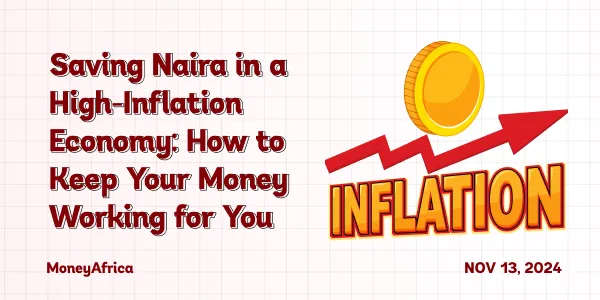Inflation is like a slow leak in your financial “bucket.” Even if your bank balance stays the same, the value of what you can buy with that money keeps shrinking. In simple terms, it’s like trying to fill a cup with a tiny hole at the bottom, the more time goes by, the less you have in real terms.
For example, if you’re saving towards a big purchase, like a car or your child’s education, inflation means you’ll need more money over time to meet the same goal. Imagine you decide to save up for a new phone, and after months of strict budgeting, you finally have the cash. But when you go to make the purchase, prices have skyrocketed. That is inflation eating into the value of your hard-earned naira.
In Nigeria, inflation is more than just a number—it’s something we see every day, from rising food costs to transport fare hikes. Unfortunately, simply parking cash in a savings account may not cut it, as inflation has outpaced the interest rates offered by banks. This is why it is essential to get creative with your savings to stay ahead of inflation’s effects.
In a high-inflation economy, it is best to go beyond a standard savings account, which usually offers a low interest rate that doesn’t keep up with rising prices. Instead, look into options that provide higher returns or more stability.
Digital Savings Platforms: Some financial technology (fintech) platforms offer savings plans with interest rates higher than banks. These accounts offer better interest rates than regular accounts, though they still might not fully outpace inflation.
Money Market Accounts: These accounts invest in short-term, low-risk instruments such as treasury bills and commercial papers. They offer slightly higher returns than a standard savings account, making them more resilient to inflation. You’ll enjoy some stability and liquidity—meaning, you can access your funds fairly easily if you need them.
Government Treasury Bills (T-Bills): Treasury bills are short-term investments issued by the government, which makes them low-risk. They pay out slightly higher returns than traditional savings, so they’re worth considering in high-inflation times. Even though T-Bills might not completely offset high inflation, they do provide a better hedge than keeping your money in cash.
Diversifying Your Savings into Foreign Currencies or Assets
In Nigeria, it is no secret that the naira’s value can fluctuate. When a local currency is rapidly losing value, foreign currency investments can help you hedge against inflation because currencies like the US dollar, euro, and British pound are more stable than the naira, and they tend to appreciate relative to it over time. By converting part of your savings into these currencies, you gain a shield against naira devaluation and inflation.
Dollar Savings Accounts: Digital savings platforms such as Ladda also offer dollar savings accounts, allowing you to save directly in dollars. It will help preserve the value of your money while still earning interest in dollars. If you have most of your expenses, obligations and future plans in dollars, for example professional examinations, “japa” plans, or goods and services to be paid for in dollars, then you must seek dollar saving opportunities.
Traditional savings might not be sufficient to preserve the value of your hard-earned naira in an economy with significant inflation like Nigeria. To truly beat inflation in the long run, saving might not be enough and investing becomes essential. Money should be invested, not saved. The value of your money can be preserved and even increased by selecting the appropriate saving options, diversifying into foreign assets, and implementing investment techniques intended to outperform inflation.
The goal is simple: put your naira to work in ways that counteract inflation’s effects
***
Do you know that we have our own podcast? It’s MONEYTALKS!💚
Here’s a link to listen to all the amazing episodes we have!
***
Thank you for reading Money Africa’s Blog.
Please feel free to share it.
Do you have any questions? You can send an e-mail to info@themoneyafrica.com or send a DM to any of our social media channels.
***
MoneyAfrica premium plan
Are you a mid to high-income earner? Do you find communities a bit too busy? You should sign up for our premium plan.

You can learn more about that here.
***
We often get questions regarding how to plan your finances to align with your relocation plans, especially for students seeking to further their studies. As always, we have heard you, and we have put together an e-book to help you navigate this. Follow this link, to get your FREE copy of the e-book: The Japa Encyclopedia.
***
Get our annual subscription and learn more about investing safely and building a solid portfolio in 2024.
Don’t forget to:
- Join our community, if you want to smash your 2024 financial goals. It takes at least 30 days to build great habits that will last you a lifetime. So why not start now? There is a lot you can achieve.
- If you would like to document your financial journey in 2024, then our journal would be an excellent fit for you. It costs ₦7,500 (excluding delivery).
- Get a budget sheet to track your monthly expenses. Click here
- Get an investment tracker to be on top of all your investments. Click here
MoneyAfrica is a financial literacy platform. Our goal is to make everyone better with their finances.
We do this by engagements via our:
– social media handles
– platforms for paid community members (for adults and students)
– webinar sessions with corporate clients
Would you like to join any of the communities? Please click here
Would you like us to hold a webinar for your company’s staff? Please send an email to info@themoneyafrica.com


